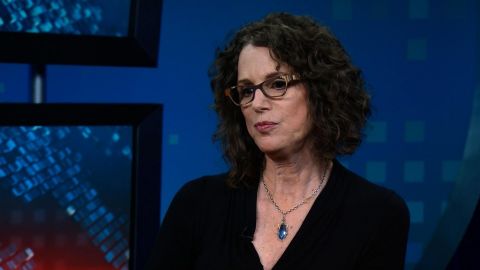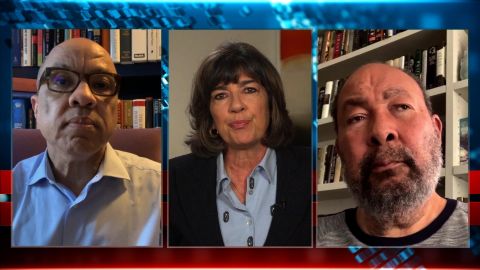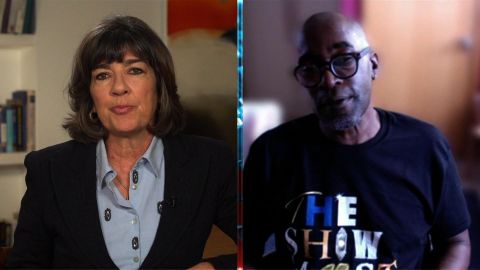Read Transcript EXPAND
CHRISTIANE AMANPOUR: Now, when it comes to racism, of course, most decent white people have the same visceral reaction: I’m not a racist. But our next guest, Dr. Robin DiAngelo, argues that’s, sadly, not true. In her 2018 book “White Fragility,” DiAngelo digs into unconscious biases and why white people are so defensive when it comes to talking about race. Now “White Fragility” is right back at the top of the bestsellers list, as people seek to educate themselves. And so we’re airing an extended version of a 2018 discussion between DiAngelo and our Michel Martin.
(BEGIN VIDEOTAPE)
MICHEL MARTIN: So, what’s white fragility? That’s the title of your book is “White Fragility,” and the subtitle is “Why It’s so Hard for White People to Talk About Racism.” Why white fragility, and how do we recognize it?
ROBIN DIANGELO, AUTHOR, “WHITE FRAGILITY”: The fragility part is meant to capture how little it takes to set white people off, to set us off into defensiveness. So, for many white people, the mere suggestion that white has meaning will cause us to erupt in defensiveness. For many of your listeners, the fact that I’m generalizing right now about white people will set off the defensiveness. Individualism is a really precious ideology for white people, and we do not like to be generalized about. My response to that is, I’m a sociologist. I’m quite comfortable generalizing about groups of people. Social life is observable and describable in patterned ways. And, yes, I’m an individual. I’m also a member of a social group, I have to be willing to grapple with the collective messages we’re all receiving, because we live in a shared culture.
MARTIN: So let’s back up for a second and talk about how you got interested in this work and in this subject. I know that you’re an academic. I know that you’re a lecturer and also you’ve done, what would you call it, anti-racist training?
DIANGELO: Yes.
MARTIN: Used to be called diversity training. Maybe it isn’t called that anymore.
DIANGELO: I think of myself as somebody who came from practice to theory, rather than a lot of academics who go from theory to practice. So, I applied for a job in the early ’90s for a diversity trainer. That’s what we called it at the time. I thought, of course, I’m qualified to go into the workplace and lead people on discussions of race. I’m a vegetarian. How could I be racist?
(LAUGHTER)
DIANGELO: I had that really classic liberal, open-minded kind of idea about what it meant to be racist. And I saw myself, of course, as outside of that and felt qualified. And I got the job. And I was in for the most profound learning of my life. It was a parallel process. So, two key pieces were, one, for the first time in my life, I was working side by side with people of color who were challenging the way I saw the world. And part of being white is that I could get that far in life — and I was a parent at that point. I was in my 30s, and never had I had my racial world view challenged, one; two, definitely not by a significant number of people of color and not in any kind of sustained way. And it worked like a mirror, right? I was like a fish being taken out of water. I would not have been able to tell you I had a racial world view, because, as a white person, I was raised to see myself as just human. Now, you’re a particular kind of human. I’m just human. And if we’re going to be talking about race, I expect we’re going to be talking about your race, not my race. So, most white people have a very unracialized identity. So, that was the first thing. The second was going into the workplace, overwhelmingly white employees who were mandated to be having these conversations, and the hostility was off the charts.
MARTIN: You tell some very interesting stories in this book. For example, you talked about leading a seminar where 38 out of the 40 people in the room were white, and then one of the participants literally pounds the table, yelling, white people can’t get a job. And everybody who had a job there was white. What…
DIANGELO: It’s a kind of delusion. I think that some people have said when, you’re used to 100 percent, 98 feels oppressive, right? I mean as a white person I was just raised to expect the world to be mine in absolutely any field. I see myself represented. I see myself represented in all my teachers and my curriculum and my heroes and heroines. And so just even a suggestion that we need to make sure we’re being fair and including other people seems to set the white collective off.
MARTIN: Tell me some of the things that you saw in these workshops that led you to this theory.
DIANGELO: It’s a lot like water dripping on a rock, right? I didn’t get it the first, second, third, but it’s so consistent and so patterned that it’s like a script. And after a while, you can just stand there and say, I can predict what this white person is going to say right now. And, sure enough, they say it. So: I was taught to treat everyone the same. I have people of color in my family. I was in Teach for America, that I marched in the ’60s. I taught in a diverse school. The evidence that white people give for their lack of racism is very revealing to what we think racism is. And everything I do is to try to get us off the surface, which is all this — all these narratives and get under there to the underlying framework, because despite all those narratives, I was taught to treat everyone the same, I don’t see color, our outcomes haven’t improved. By virtually every measure, there’s racial inequality in this country. And by many measures, it’s increasing, not decreasing. And I think what’s really clear, we are not post-racial, right? And so what’s happening there, right? So, the question that drives my work is, how do we pull this off? How do we insist that our race has no meaning in a society that is deeply separate and unequal by race? How do we sit, those of us who are white, in such explicit segregation, and claim there’s nothing happening here?
MARTIN: One of the things that I think some people might experience as deeply provocative is when you say that white progressives cause the most daily damage to people of color. How so?
DIANGELO: Well, why progressives are my specialty, because I’m a huge white progressive. And what I mean by that is not so much Democrat, Republican. Any white person who sees themselves as not racist, less racist, who’s thinking right now of all the other white people that they wish were listening to this program right now because they really need it, that is a white progressive. And I think we do the most daily harm, because we’re more likely to be in the lives of people of color. And yet our identities are very much rooted in this idea of ourselves being free of racism. And so, if racism comes up, we’re going to put all of our energy into making sure you see us as free of racism, and really rarely any of our energy into what we need to be doing for the rest of our lives. It certainly includes people who have conscious intent of harm, but most bias is actually not conscious. So, we have to change our understanding of racism from an individual moment that may or may not have occurred to the system we’re in and that is circulating 24/7/365. And that changes the question from, is or isn’t he or she racist, to, how is racism manifesting in this context?
MARTIN: You speak very frankly in the book about how you’ve stepped in yourself, if I can use that phrase.
DIANGELO: Yes.
MARTIN: Can you give an example of where you experienced your own white fragility?
DIANGELO: Used to be the co-director of equity for a large nonprofit. And my other director was a black woman, so we were an interracial team. And our executive assistant was also a black woman. And, one day, the company hired a Web developer to come in and design the company’s Web page. And she set meetings up with every team to interview us about what we did, so that she could design our page. So, she calls the three of us into meeting with her. And I will call her Angela. And it turns out that she’s also a black woman. So, I’m in a room with three black women, two of which I’m very close to, and one I don’t know at all. And she gives us a survey to fill out, and it’s tedious to me. It seems kind of template. It doesn’t capture the nuance of what we do. So I pushed it aside and say: “Let me explain. We go out into these different offices and we do these anti-racism trainings. In fact, Deborah here was asked not to come back when she went to such and such office. I guess her hair scared the white people.” She has long locked braids. So, I want you to notice what I’m doing. Not only am I making a joke about a black woman’s hair, which is a sensitive issue, and I do know better, but I’m positioning myself as the cool white person, and they’re all the clueless white people. And I wish I could tell you that I recognized I was doing that. I didn’t. Meeting is over. A couple of days later, the assistant, Marcia, comes to me and says: “Angela, I was really offended by that joke you made about black women’s hair.” And I immediately: “Oh God, thank you.”And I called Angela, and I said: “Would you be willing to grant me the opportunity to repair the racism that I perpetrated towards you in the meeting last week?” She said, yes. We sat down. We talked about it. And she said: “I don’t know you. I have no relationship with you. I have no trust with you. And I do not want to be joking about black women’s hair in a professional work meeting with a white woman I don’t know.” “I hear you. I apologize.” Then I asked: “Is there anything I missed?” And she said, “Yes. That survey you so glibly shoved aside, I wrote that survey, and I have spent my life justifying my intelligence to white people.” On that, apologize, ask: “Is there anything else that needs to be said or heard that we might move forward?” And she said, “Yes. If we’re going to work together, I’m sure you’re going to run your racism at me again. And so the next time you do, would you like your feedback publicly or privately?”
MARTIN: Interesting.
(LAUGHTER)
DIANGELO: Well, I love her for that. I said: “Publicly, in my case, please. It’s really important that other white people see that I’m not free of this, but it gives me an opportunity to model nondefensiveness.” And: “Are we good?” “We’re good.” And we moved on. And one of the things she said to me was: “This kind of stuff happens to us all the time. What has never happened to me before is what you’re doing right now, this repair. And I appreciate it.” And I think white fragility functions as a kind of everyday white racial bullying. We white people so often make it so miserable for people of color to talk to us about what they’re experiencing from us, to talk to us about the inevitable and often unaware racist patterns we’re manifesting, that, most of the time, they don’t.
MARTIN: You said you don’t want white people to feel guilty, which is exactly what I think some people listening to our conversation will feel and will think that you want to evoke. So, why do you say you don’t want white people to feel that?
DIANGELO: Well, because it’s — you didn’t choose your socialization. You didn’t choose your conditioning. You were born into a society that set you up in these ways. You don’t need to feel guilty, unless you’re — you know that and you’re not doing anything about it, right? So, I think the key — guilt is a natural part of the process. But it’s what you do with the guilt. If it becomes your excuse for not engaging any further, then it’s just indulgent, and you’re just using it to protect your position. If it motivates you to keep going, then it’s useful.
MARTIN: You have a group of people who are resurgent at the moment, and you certainly see them openly discussing their view that they don’t want a meritocracy. They want a white — a hierarchy with white people on top, particularly white males, I want to say. How do you understand that?
DIANGELO: When I think about it, there’s not one single thread. There are many threads. And it’s also what makes us so often irrational on this topic, because there’s so many different things going on. Politicians have always been able to manipulate the white collective through racial animus. Maybe some of your listeners are familiar with the Southern strategy, you know, that coded — back in the Reagan days, welfare queens, those kind of coded terms, dog whistle. We’re beyond dog whistle. And now you can just come out and, at the top of the hierarchy, in the highest office in the nation, is pretty explicit racism.
MARTIN: What about…
DIANGELO: Go ahead.
MARTIN: … the people who voted for Obama and then voted for Trump?
DIANGELO: I think that Obama, it was symbolic. I think what Obama did was allow us to feel really good about ourselves under very narrow terms, right? If the word racism ever came out of his mouth, I don’t know what would happen, right? He had to be the perfect black man, right, the safe black man. He’s also brilliant and clear and educated. And so, also, at the same time, that allows me to feel good about myself. There’s also a little bit of challenge there in how powerful a black man he is, right? And I would ask any white person who voted for Obama and sees that as kind of their evidence that they’re free of racism to ask themselves, how did it change your life on the ground? How did Obama’s presidency change the lived experience for black people in this country day in and day out? I don’t think that it did. It was important symbolically, but mass incarcerations, school-to-prison pipeline, these things have not diminished, right? In many ways, they’ve increased.
MARTIN: Do you see Trump as a reaction to Obama? And, if so, why?
DIANGELO: I see Trump as a reaction to Obama, because Trump gave permission to the resentment that was roiling under the surface.
MARTIN: Resentment of what?
DIANGELO: Of black advancement, of black uppityness, of, to use a Jim Crow analogy, you will step off the curb when I come down it. You will look me — you will not look me in the eye. is racism is explicit and undeniable, and that that wasn’t a deterrent, I think white people have to look really hard at. Why was that not a deterrent to you? In fact, I would wonder if it wasn’t actually something that excited you and allowed you to indulge in, and not admit it.
MARTIN: When you say, though, give — where’s your — you’re a scholar. Like, where’s your data? Like, what makes you say that?
DIANGELO: There’s a kind of glee in the white collective when black bodies are punished. When you think about the way football players are talked about, as if they, how dare they not be grateful, we don’t tend to talk about white football players in terms of, you should be grateful for what you have, right? There’s something really deep going on here. And Toni Morrison beautifully argues that white people need black people. There is no white without black. I cannot be superior if you are not inferior. And so there’s a kind of investment in those positions. And it’s the bedrock of this country, right? It’s maybe buried in a way that it wasn’t in the past, but it sure looks like it’s coming back up.
About This Episode EXPAND
Darren Walker and Richard Parsons discuss how corporate America should address racism. Actor Patrick Robinson reflects on protests in the UK and the new BBC drama “Sitting in Limbo. Plus, we re-air an extended version of Michel Martin’s conversation with Robin DiAngelo on her book “White Fragility.”
LEARN MORE


